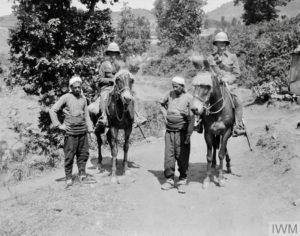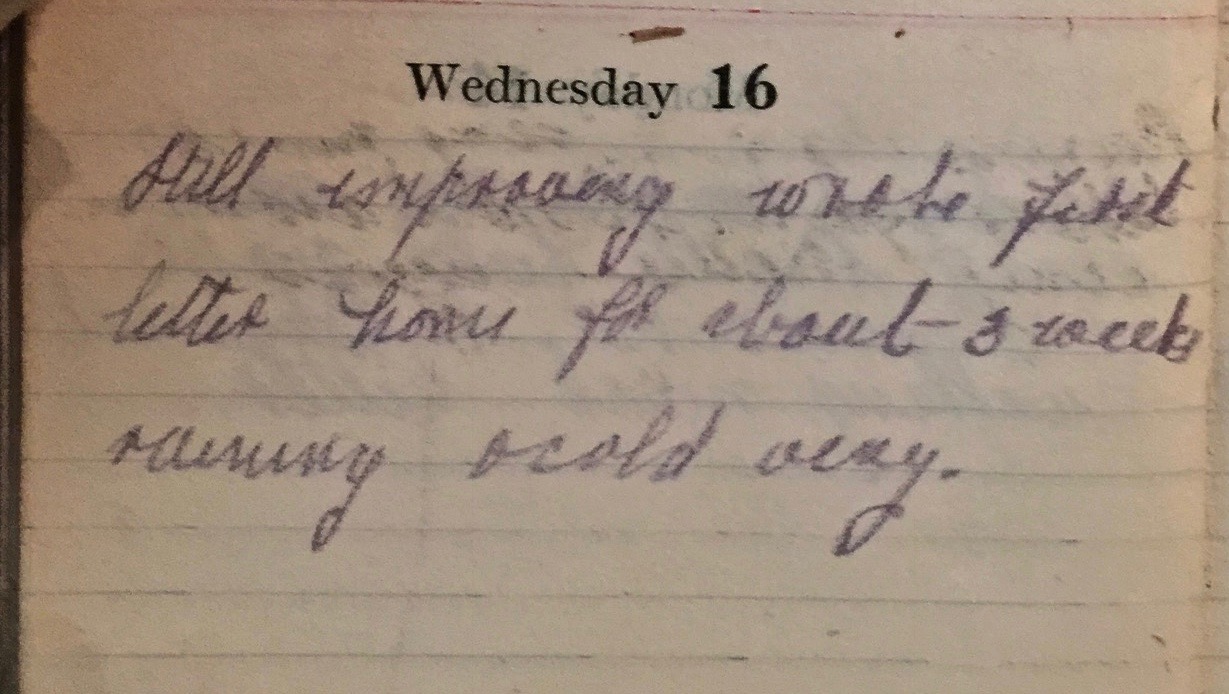Wednesday October 16th, 1918
Still improving. Wrote first letter home for about three weeks. Raining and very cold.
Agents and Spies
Throughout the war, both sides used spies and agents – to find out information about the enemy and to prevent the enemy reciprocating. For example, in Britain, written communication was censored through both the Post Office service and ranking officers in the armed forces.
The ‘glamourous’ side of spying was evocatively summed up by Ferdinand Tuohy in his popular book ‘The Secret Corps’:

‘Fair-haired young Englishmen tramped across Persia, disguised as Kurds, and Grecian girls from Chios and Mytelene were imported for training as agents in Athens; American bar-tenders over-heard bibulous military talk, and chambermaids rummaged in the kit bags of generals.’ ¹
The photograph shows two Turks caught in suspicious circumstances in Salonika in August, 1916. They are handcuffed to the stirrups of British cavalrymen.*
Closer to the front line and more mundane, but probably more effective, was the routine synthesis of gathered intelligence. This could include air reconnaissance reports and photographs, interrogatories of prisoners and captured documents.
Knowing its potential value, the Allies pored over such captured information and tried to minimize its availability to the enemy. As General Jack noted, even the potential of items falling into enemy hands could be very compromising. Whilst waiting for the start of what would become the Last Battle of Ypres, he noted:
’Last night the enemy, covered by a heavy bombardment, raided the Belgian trenches just north of ours, and still hold some of them. This is most unfortunate as we cannot tell what maps and orders may have been captured nor what information regarding the Allied plans may have been obtained from prisoners.’ ²
The same day the commanders decide to postpone the offensive.
No wonder the 9th is put on high alert today.
9th Battalion War Diary – 16th October 1918 – Maurois
Training and reorganization. From 06:00 hrs tomorrow the Battalion will be under one hour’s notice to move. Owing to the enemy retirement and to the open conditions of the present fighting, it is highly probably that the enemy has left agents behind him, also that he will take every opportunity to send agents and spies across into our lines. Coys should therefore safeguard documents that might be of value to the enemy.
References & Further Reading
¹ ‘The Secret Corps, A Tale of “Intelligence” on All Fronts” by Captain Ferdinand Tuohy, John Murray, London, 1920, 4th edition. Page 3
² ‘General Jack’s Diary, War on the Western Front 1914-1918’ edited by John Terraine, Cassell, 2003, originally published 1964. Page 269, September 22nd 1918
* Q 32299, copyright Imperial War Museums


